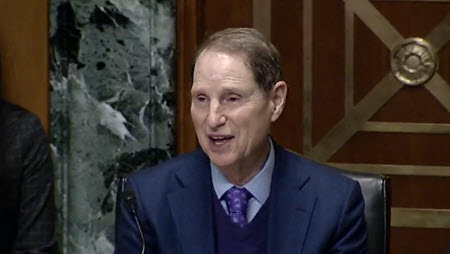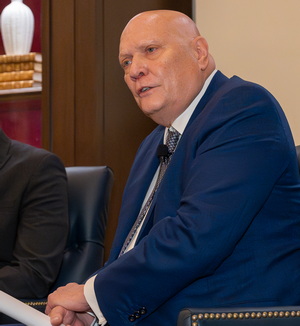
Bills introduced yesterday in the Senate and House would create a new tax incentive aimed at increasing the supply of moderate-income rental housing. The legislation seeks to expand the construction and rehabilitation of housing for middle-class families and young people starting their careers, while enabling workers to live in communities where they are employed. (Senate Finance Committee news release and bill summary, Dec. 7)
Workforce Housing Tax Credit
Roundtable Support

The Roundtable’s Real Estate Capital Policy Advisory Committee (RECPAC) has formed an Affordable Housing Working Group, which is working with the Research Committee to develop proposals on expanding the nation’s housing infrastructure.
# # #

Senate Finance Committee Chairman Ron Wyden (D-OR), above, and 15 of his Senate colleagues recently introduced the Billionaires Income Tax Act (S.3367), which would tax the appreciation of wealthy individuals’ assets. On Tuesday, the Supreme Court heard oral arguments in Moore v. United States, a case challenging the federal government’s authority to tax unrealized gains under the 16th Amendment.
Billionaires Income Tax Act (BITA)
Roundtable Position and Outlook

Moore v. United States

A majority of the justices signaled they are hesitant to weigh into the broader debate of how to define income for tax purposes. A decision in Moore is not expected until June 2024. (USA Today and PoliticoPro, Dec. 5 | Tax Foundation, Aug. 30)
# # #

More than half of the federal workforce is not working in their agency offices, according to the Government Accountability Office (GAO). Sen. Joni Ernst (R-IA) released a list this week based on the GAO data that shows federal space utilization percentages range from a low of 7% to 49% with most agencies using less than 30%. (Agency list | Sen. Ernst news release | DailyMail, Dec. 6)
Federal Employees’ Return to Office
Roundtable Response

Roundtable President and CEO Jeffrey DeBoer has consistently emphasized that federal policies promoting remote work undermine the health of cities, local tax bases, and small businesses. The Real Estate Roundtable has urged President Biden and national policymakers to end government policies that encourage remote working arrangements for federal employees. (RER letter to President Biden, Dec. 2022; RER letter to Senate, April 2023)
# # #

The United States joined China, the UK, and the larger European Union this week in an international initiative to accelerate the buildings sector’s ability to reach “near zero” emissions by 2030. (United Nations press release, Dec. 6)
SBTi

CFTC Guidelines and EPA’s Portfolio Manager

EPA’s improvements to its free online Portfolio Manager tool, used by nearly 25% of U.S. building space to measure energy use and GHG emissions, is widely supported by the CRE industry. (Coalition letter to EPA, Sept. 14 and Roundtable Weekly, Sept. 15)
# # #

Real Estate Roundtable President and CEO Jeffrey DeBoer, above, is one of the "Top Lobbyists" in Washington, DC for 2023, according to the widely-read Capitol Hill publication, The Hill. This is the sixth consecutive year that DeBoer has earned the recognition. (The Hill, Dec. 6)
DeBoer commented, “I am honored to lead The Real Estate Roundtable’s policy advocacy efforts and very humbled to be included on The Hill’s top lobbyist list. This personal recognition by The Hill reflects the collective efforts of the Roundtable membership, leadership, and staff. Together we work very hard to deliver non-partisan, data-based policy positions, guided by what is good for communities, job creation, and the economy. This has always been the foundation of our organization’s effectiveness, and it has proven to be even more critical given today’s increasingly challenging policy environment.”
# # #